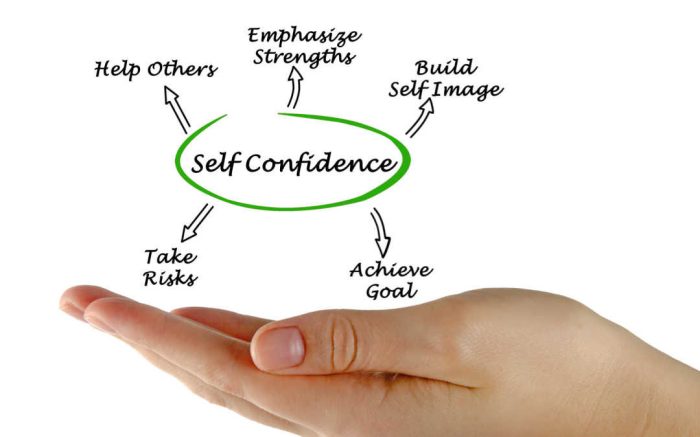Building Self-Confidence starts with recognizing your worth and potential, paving the way for a journey of growth and empowerment. Dive into the world of self-assurance and discover the keys to unlocking your true self.
As we unravel the layers of self-confidence, we’ll explore its impact on personal development and how it shapes our interactions with the world around us.
Introduction to Building Self-Confidence

Self-confidence is the belief in oneself and one’s abilities. It plays a crucial role in personal development as it empowers individuals to take on challenges, make decisions, and pursue their goals with determination.
Having self-confidence can positively impact various aspects of life. For example, in academics, students who believe in their capabilities are more likely to perform well in exams and presentations. In social situations, individuals with self-confidence can communicate effectively, build relationships, and assert themselves when necessary.
It is important to note that self-confidence is different from arrogance. While self-confidence involves a realistic understanding of one’s strengths and weaknesses, arrogance is characterized by an excessive sense of self-importance and a lack of regard for others.
Difference between Self-Confidence and Arrogance, Building Self-Confidence
Self-confidence is rooted in self-awareness and a positive self-image, whereas arrogance stems from an inflated ego and a need to validate one’s superiority over others. It is essential to strike a balance between confidence and humility to cultivate healthy relationships and succeed in various aspects of life.
Factors Influencing Self-Confidence
Building self-confidence is influenced by a variety of factors, both internal and external. Understanding these factors can help individuals in their journey to boost their self-esteem and belief in themselves.
Self-awareness and self-acceptance play a crucial role in building self-confidence. When individuals have a clear understanding of their strengths, weaknesses, and values, they are better equipped to set realistic goals and work towards achieving them. Accepting oneself for who they are, flaws and all, can lead to a more positive self-image and increased confidence.
External factors such as social environment, upbringing, and experiences also impact self-confidence. A supportive and nurturing environment can foster a sense of security and belief in one’s abilities, while negative experiences or criticism can hinder confidence levels. It is essential to surround oneself with positive influences and seek out experiences that build confidence rather than tear it down.
Setting achievable goals is another key factor in boosting self-confidence. By breaking down larger goals into smaller, manageable tasks, individuals can track their progress and celebrate their accomplishments along the way. This sense of achievement can help build confidence and motivate individuals to continue striving towards their goals.
The Power of Setting Achievable Goals
Setting achievable goals is a powerful tool in building self-confidence. When individuals set specific, measurable, and realistic goals, they have a clear direction to work towards. This clarity helps individuals stay focused and motivated, leading to a sense of accomplishment when goals are achieved. By setting achievable goals, individuals can challenge themselves while still setting themselves up for success.
Strategies for Building Self-Confidence
Building self-confidence is crucial for personal growth and success. By implementing certain strategies in your daily routine, you can work towards enhancing your self-esteem and belief in yourself.
Practicing Self-Care
Self-care plays a significant role in boosting self-confidence. Taking care of your physical, emotional, and mental well-being can help you feel more positive about yourself. Make time for activities that bring you joy, prioritize rest and relaxation, and fuel your body with nutritious food.
Positive Self-Talk
Positive self-talk involves replacing negative thoughts with affirming and encouraging statements. By challenging self-doubt and criticism, you can reframe your mindset and build a more optimistic view of yourself. Remember to be kind and supportive in the way you speak to yourself.
Visualization and Affirmations
Visualizing success and repeating affirmations can be powerful tools for increasing self-confidence. Picture yourself achieving your goals and remind yourself of your strengths and capabilities through affirmations. This practice can help you stay focused, motivated, and self-assured.
Overcoming Self-Doubt and Fears

Confronting fears and stepping out of comfort zones are essential steps in strengthening self-confidence. When we face our fears head-on, we prove to ourselves that we are capable of overcoming challenges and obstacles. This process helps us build resilience and belief in our abilities, ultimately boosting our self-confidence.
The Role of Failure in Building Self-Confidence
Failure plays a crucial role in the journey to building self-confidence. It teaches us valuable lessons, helps us grow, and shows us that setbacks are not the end of the road. By embracing failure as a learning opportunity, we develop a growth mindset and the confidence to persevere in the face of adversity.
- Failure encourages resilience and perseverance.
- It provides valuable feedback for improvement.
- Overcoming failure builds self-belief and confidence.
Examples of Famous Individuals Overcoming Self-Doubt
“Success is not final, failure is not fatal: It is the courage to continue that counts.” – Winston Churchill
- Oprah Winfrey: Overcame a challenging upbringing to become a media mogul and philanthropist.
- J.K. Rowling: Faced rejection multiple times before achieving success with the Harry Potter series.
- Michael Jordan: Experienced setbacks but persisted to become one of the greatest basketball players of all time.